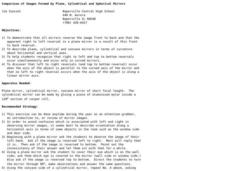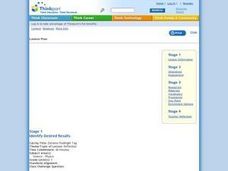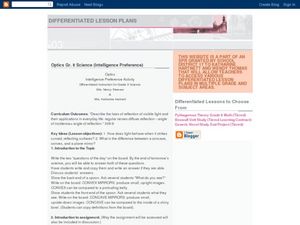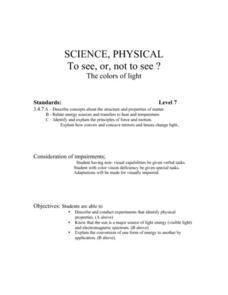Michigan Technological University
Giant Mirrors
Did you know some retailers use curved mirrors in their fitting rooms to make customers look thinner? Pupils view themselves in convex and concave mirrors to understand the difference. The resource includes big ideas for multiple age...
Curated OER
Comparison of Images Formed by Plane, Cylindrical and Spherical Mirrors
Students experiment with differently shaped mirrors. In this reflection and optics instructional activity, students investigate the visual effects of reflected images in mirrors. They use plane, cylindrical, and concave mirrors for the...
Curated OER
The Geometry of Real Images
In this math worksheet, students read the examples for using the techniques of mathematical modeling. They draw the angles in order to simulate the reflection of light while using a concave mirror.
Curated OER
Spherical Mirrors
Learners view images in a spherical mirror and interpret the path of light. In this physics lesson, students view a large spherical mirror demonstrated by the instructor. They use shiny serving spoons to investigate the path of...
Curated OER
Comparison of Images Formed by Plane, Cylindrical, and Spherical Mirrors
Students observe how reflections differ in various types of mirrors. In this reflection lesson, students use cylindrical mirrors, plane mirrors, and concave mirrors to observe how each reflects the student's face.
Curated OER
Applied Science - Physics (5B) Post Lab
Fifth graders analyze optical images. in this optical lesson, 5th graders look at how light reflects and refracts. They discuss different types of lenses and how they change the picture that is taken.
Dick Blick Art Materials
Have a Ball!
M.C. Escher's "Hand with Reflecting Globe" and the work of Dick Termes, inspire this activity. Kids check out their reflection in a Christmas ornament or a bubble filter and recreate this distorted image on a vinyl ball.
Curated OER
Comparison of Images Formed by Plane, Cylindrical (concave side), and Spherical (concave side) Mirrors
Students study mirrors and see how images can be reversed. In this reflection lesson students demonstrate that all mirrors reverse images and that the apparent right to left reversal in a plane mirror is a result of that reversal.
Curated OER
Lenses and Mirrors
Students investigate lenses and mirrors showing how they bend and reflect light waves.
Curated OER
REFLECTIONS OF SCIENCE
Students discover the different types of mirrors, their properties and some of their applications. They have already been introduced to some of the properties of light and have already experienced some of the different types of mirrors...
Curated OER
Extreme Flashlight Tag
Fifth graders view a Powerpoint show about reflecting light. They experiment through a reflection simulation on the internet. Students complete the activity by using mirrors and light to complete send light to a specified spot.
Curated OER
Intelligence Preference
Eighth graders describe how light behaves when it strikes a surface. In this physics lesson, 8th graders investigate how the different types of mirrors reflect light. They work with their chosen group on a task they selected.
Curated OER
Microscopes and Telescopes
Students analyze a microscope and study what they do. In this investigative lesson students study how microscopes were first invented, and how ray diagrams are used in conjunction.
Curated OER
To See or Not to See: The Colors of Light
Seventh graders describe and conduct an experiment that identifies the physical properties of light. They explore sources of visible light and an electromagnetic spectrum. Students explain the conversion of one form of energy to another.













